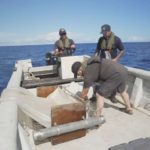
(NEW YORK) — The deep blue waters, shimmering cliffs and palm tree-lined beaches of Easter Island face a growing threat: plastic.
“So now there are some things that belonged to this beach. For example, the rock belonged to this beach. The shell belonged to this beach. But the plastic, no,” said Rapa Nui native Ludo Tuki Burns.
Burns has spent most of his life preserving the island.
He organizes regular beach clean-ups at places suc as Anakena Beach, where he took ABC News’ Good Morning America to get a closer look.
“The plastic is going to float and then with this tool you are going to take [it out of the water],” said Burns. “And so you will take only the plastic.”
Ivan Hinojosa is a marine biologist who is studying plastic pollution on Easter Island. He estimates a ton of plastic washes ashore each month.
Below the surface Hinojosa hunts for microplastics — plastic that has since degraded in the ocean and carried by strong currents from all over the world.
“I can distinguish at least five different types of plastic here just with my eye, but in the microscope we’re going to find more,” said Hinojosa.
Degrading plastics also release greenhouse gasses that can interfere with the ocean’s ability to store carbon. It’s estimated that degrading plastic in the ocean releases 76 metric tons of methane per year, contributing to climate change, according to a study.
Although barely noticeable by the human eye, microplastics can take their toll through food. A study found that 80% of bait fish used to catch local tuna contain microplastics in their stomachs.
“For example, the plastic attracts all the chemicals that are in the water. So you have a higher concentration of toxins in the plastics,” said Hinojosa. “So that when the animals eat them, they’re also [eating] plastic and some poison chemicals.”
Despite the deluge, the local community is determined to fight back on behalf of future generations. Burns said when things are thrown away, they don’t just disappear. All trash ends up somewhere.
“Well, my message is that we are here in the middle of the Pacific and we receive all the things you think don’t matter. We receive it,” he said. “I believe that we can make a change.”
Copyright © 2023, ABC Audio. All rights reserved.
